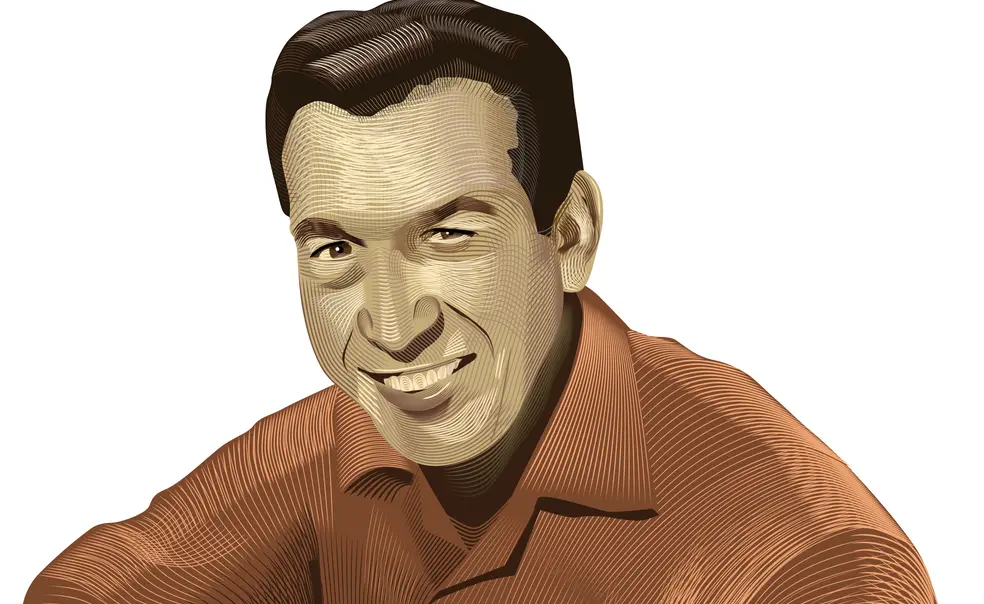The Triangle Club: a 132-year-old training ground for many of Princeton’s most famous writers and actors. The years that gave the club its modern character were arguably 1930-40, when a certain kind of cracking-wise, let’s-put-on-a-show college theater was in its golden age, and when an inimitable group of performers, including Josh Logan ’31, who co-authored the musical South Pacific, and Jimmy Stewart ’32 paced the boards. But the alum from these years who best embodied Triangle’s spirit of high thinking and low living was José Ferrer ’33.
It’s hard to be the sort of person whom Princeton makes rougher around the edges, but Ferrer managed it.
Born in Puerto Rico, Ferrer moved to New York City with his parents at the age of 6. Gifted and expensively educated, he cracked the entrance exams for Princeton when he was 14, though he took the University’s advice to take a gap year before he arrived. (He spent it at a posh boarding school in Switzerland.) He played the piano, as gifted children do, and everyone thought he had a future playing concert halls.
It’s hard to be the sort of person whom Princeton makes rougher around the edges, but Ferrer managed it. Campus in the ’30s was lively. Prohibition was in force, so every afternoon, bootleggers swarmed the quads, carrying paper-bag deliveries of terrible whiskey and gin. Ferrer found his nimble piano playing in demand at parties, so he started a jazz band, “José Ferrer and His Pied Pipers,” that played seemingly everywhere booze flowed.
Soon they were kicking up joints in New York and beyond. “When the Depression hit, rich papas who couldn’t afford Paul Whiteman hired us,” Ferrer later said. “We made a lot more dough than college boys should have in their pants.”
The Triangle Club had a reputation for being “nonsocial,” meaning mostly that it attracted weirdos. The president of Triangle, Bert Brush ’33 *35, thought the Ferrer he saw onstage would fit in just fine, and he explained repeatedly to Ferrer that, though Ferrer thought he was a well-bred architecture major, he was actually “a born actor,” and he should stop playing the role of a serious person and start getting serious about playing roles. Brush cast Ferrer as one of the leads in the club’s big touring play, immersing him in the world of grease paint, wardrobe trunks, and froofy wigs. (Ferrer played an 18th-century French valet who swaps places with a lord.)
“Once I was in, I was hooked,” Ferrer said.
After graduating, Ferrer started graduate school in New York City — partly as a concession to his father, who had refused to see Ferrer perform with Triangle at the Metropolitan Opera House, believing acting to be beneath his son. But Triangle is a hard sickness to cure, and soon he returned to the life of the theater.
He rose quickly on Broadway, then in Hollywood, starting with screwball comedies, but finding his stride with tragic, cerebral characters such as Iago, Don Quixote, and Cyrano de Bergerac. In the latter role, he won both the Tony Award, in 1947, and the Academy Award for Best Actor, in 1951. (His father eventually forgave him — and even reveled in telling stories about his “outrage” when Princeton corrupted his son.)
Ferrer didn’t lose all his native polish. He had expensive tastes all his life. He dressed elegantly. He had an upper-class New York accent, which, having Rs as smooth as an egg cream, would have fit in amid the snobbish cadences of ’30s Princeton. But he knew how to cut loose, as he did in the Broadway hit Charley’s Aunt. Wrote The Philadelphia Inquirer on June 2, 1946: “He swung from chandeliers in his woman’s get-up with wig askew and cigar dangling from mouth. He did nip-ups and cartwheels, flounced in chairs with gartered legs hoydenishly crossed, and dropped unmentionables all over the stage.” Tell me a Hasty Pudding man could beat a Triangle man at that.












4 Responses
José Figueroa ’81
2 Years AgoVideo Tribute to José Ferrer from Adelante Tigres Latino Alumni Conference
Adelante Tigres prepared this tribute to José Ferrer that was shown during the conference in October of 2017. Enjoy.
Tom Roberts ’71 k’32
2 Years AgoA Picture of the Band
My father, Richard Brooke Titus Roberts ’32, was in the band mentioned at the beginning of the Princeton Portrait of José Ferrer ’33 (March issue). I have a picture of the band. Ferrer is standing at the left. He was the lead singer. My father is holding his banjo.
According to my “source,” José Ferrer was not the best singer, but the girls all adored him. I have the banjo that my father played. It still has the blood stains from one late night session during which Dad lost his picks but kept on playing.
Editor’s note: This letter has been updated to correct the photo caption.
Jim Perry k’32
2 Years AgoCorrection on Ferrer’s Piano Player
In your May Inbox column, a letter to the editor and a picture caption misidentifies the piano player in José Ferrer’s band. It was Robert Perry ’32, not Jimmy Stewart ’32.
Bob Perry, my father, was an amateur pianist all his life, as well as an accomplished accordionist.
btomlins
2 Years AgoFor the Record